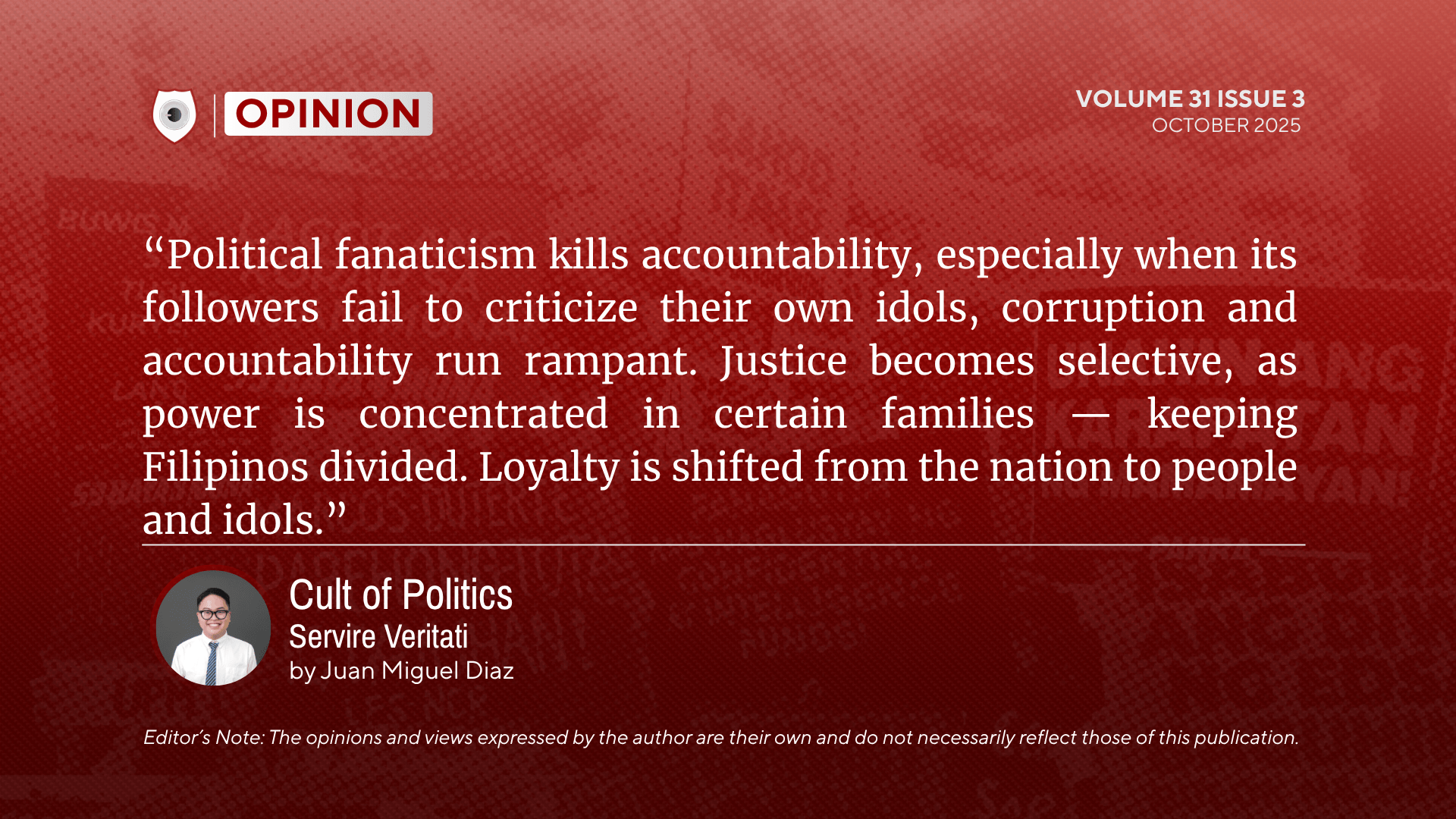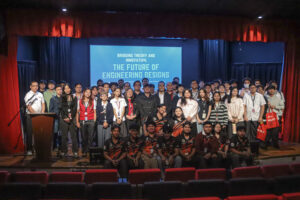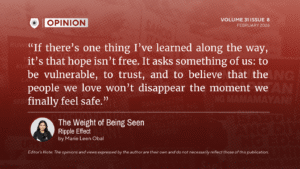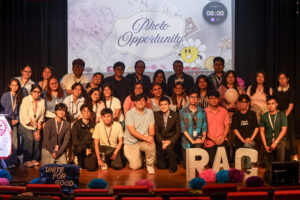Written By Juan Miguel Diaz | October 27, 2025

Graphic Art by Juli Mondelo
Cult of Politics
ACROSS the globe, fanaticism is a complex behavior evident in various forms and activities. In the realm of politics, fanaticism plays a crucial role, especially in modern media — where stories are often manipulated and crafted to lead fanatics.
In the context of Philippine politics, it is a sickness lingering in the shadows of democracy. Looking at the national government, we have a few well-known groups — the Duterte Diehard Supporters (DDS), the Kakampinks (supporters of former Vice President Leni Robredo), and the Solid Marcos (supporters of the current administration). Subgroups include the Romuladez fanbase and the Sotto fanbase (thanks to the vocal Mayor Vico Sotto and the recent election of Senate President “Tito” Sotto III). Where do you belong? What’s your clique? What’s your cult?
Looking at history, this culture of fanaticism can be traced back to the colonial Philippines, where loyalty to the friars and the elites was essential to survival. It was deeply embedded in the structures of loyalty and power, under the guise of religion as imposed by Spanish colonizers. To further perpetuate this system, religion was used as a tool to push forward the idea of fanaticism, as faith and authority intertwined.
This eventually transformed into patronage politics, where support is nurtured using gifts, favors, or benefits instead of genuine service to the people. In an article, I read that in today’s time, fanaticism is rooted in Filipinos’ deep desire for certainty in times of uncertainty. People choose to believe in empty words of leaders, just because they idolize them, failing to see the cracks behind the service they give.
It is further compounded by today’s digital landscape. In social media, armies, trolls, and online defenders of various political families attack anyone who criticizes their political idol, which also leads to the continuous perpetuation of misinformation. One click is all it takes to see this playout. No one is safe from these attacks — whether you may be a lawyer, bishop, activist, or just a simple concerned citizen. Rational thinking of Filipinos fades as cult-like worship ensues. In a playing field such as this, truth and facts no longer hold weight, only loyalty does.
This culture of fanaticism has cultivated a cult of politics, one where our society is divided into different groups based on who you idolize. Fanaticism converts Filipinos to believers of political families and individuals rather than placing trust in the system. This fostered a culture of loyalty, turning citizens into blind cheerleaders rather than staunch critics demanding better governance and service. From mere participants, people are turned into pawns and pets of our very own democratic process. Fanaticism opens doors of opportunities, perpetuating corruption and abuse to flourish as it shrouds itself under the guise of “utang na loob” and popularity politics.
Just last Oct. 18, on the anniversary of the Jesus Is Lord Church, Worldwide founder and lawmaker Eddie Villanueva, father of Senate Minority Leader Joel Villanueva who has been linked to the corruption scandal, defended his son in front of the church’s religious followers. I’m not saying that they are a cult, but these tendencies wherein platforms are used to clear a politician's name, what more your son’s name, create and foster fanaticism among them.
Due to the ingrained culture of fanaticism, Filipinos choose to defend the lies of a politician even though they are confronted with the truth. Government leaders are treated like saints and gods — infallible from committing mistakes, untouchable from the masses, blameless and upright. The thing is, politicians are not saints, they are public servants — elected officials expected to exercise the functions of their office. People who must and should be held accountable when needed.
Political fanaticism kills accountability, especially when its followers fail to criticize their own idols, corruption and accountability run rampant. Justice becomes selective, as power is concentrated in certain families — keeping Filipinos divided. Loyalty is shifted from the nation to people and idols.
Truth be told, people's blind devotion has weakened the ideals and very essence of democracy. We place our trust in idols, families, and politicians despite their continuous streak of failures. Truth now becomes negotiable. Discourse is now toxic. Mediocrity of public service became the new norm.
One hopeful Filipino may ask, how can change truly happen?
Filipinos must be honest to accept this existing culture of fanaticism existing for decades within the country. We must be ready to reject our idols, hold people accountable, and put our loyalty not on people but on our country.
Revolution and change start only when we reject political fanaticism intertwined within the political fabric of our nation. Patriotism does not equate to blind loyalty. Real love for the country is when Filipinos are able to freely speak up, criticize, and denounce — even against the people they once voted for.
After all, Filipinos deserve citizens loyal to the country, not fanatics devoted to idols.
Volume 31 | Issue 4



